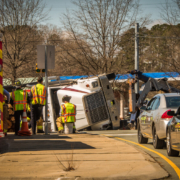Second Impact Syndrome and other Concussion Complications
A concussion is a traumatic brain injury (TBI) that is considered by many medical professionals to be a milder form of TBI. According to the Centers for Disease Control and Prevention, concussions are “caused by a bump, blow, or jolt to the head or by a hit to the body that causes the head and brain to move rapidly back and forth. This sudden movement can cause the brain to bounce around or twist in the skull, creating chemical changes in the brain and sometimes stretching and damaging brain cells.”
The effects of a concussion are usually temporary, and signs and symptoms may include:
- Temporary loss of consciousness
- Headaches or head pressure
- Ringing in the ears
- Dizziness
- Nausea and vomiting
- Confusion
- Fatigue
- Memory loss
- Slurred speech
- Delayed response to questions
- Irritability
- Mood and personality changes
Some symptoms of a concussion may surface immediately, while others may take a few hours or even a few days or longer to develop.
Although a concussion may be considered “mild” compared to other forms of TBI, there are serious complications that can result from this type of injury. The Mayo Clinic lists several potential concussion complications:
- Post-Traumatic Headaches: Some concussion sufferers experience ongoing headaches for as long as a few months after the injury occurs.
- Post-Traumatic Vertigo: Dizziness or a sense that your head is spinning around can continue for as long as a few months after the injury.
- Post-Concussion Syndrome: Headaches, dizziness, trouble thinking clearly/confusion, and other concussion symptoms can continue for several weeks or months after the injury occurs.
- Cumulative Affects of Multiple Brain Injuries: The Mayo Clinic says, “it’s possible that some people who have had one or more traumatic brain injuries over the course of their lives are at greater risk of developing lasting, possibly progressive, impairment that limits function. This is an area of active research.”
- Second-Impact Syndrome (SIS): This is a rare condition in which an individual suffers a second concussion before their first concussion has fully healed. When this occurs, it can cause rapid and severe brain swelling, and in many cases, the results can be swift and fatal.
The Dangers of Second-Impact Syndrome
Although SIS is a rare condition, it is more common among certain sectors of the population, such as athletes. That said, second-impact syndrome can happen to anyone who sustains multiple concussions within a short period of time. For example, if someone was unfortunate enough to be involved in two high-impact vehicle crashes within a few days of each other, they may be at risk for SIS.
Second-impact syndrome occurs most often with younger athletes (typically around high school age) who play high-impact sports. Although SIS is rare, some of the factors that contribute to this injury among young athletes are not. For example, it is not unusual for an athlete (who is in the midst of an adrenaline rush) not to notice a head injury and continue to play. As an aside, it is common for those involved in motor vehicle accidents to experience this same type of adrenaline rush, which may cause them not to notice various injuries until later on.
Even if the athlete feels the effects of a head injury, they may not think it is all that serious, so they don’t report it to a coach or parent. There may also be pressure put on the athlete (internally or externally) to continue playing in spite of the injury. The risk of second-impact syndrome and the depth of information now being learned about the cumulative effects of multiple brain injuries are major reasons the National Football League (NFL) now uses a concussion protocol.
To prevent second-impact syndrome from occurring and to minimize other concussion complications, it is important for those who experience any type of head trauma due to an accident or from playing sports to be examined right away by a qualified medical professional. It is also important to do everything possible to avoid another bump, jolt, or blow to the head while they are recovering from their current injury.
Suffered a Head Injury? Contact a Seasoned West Virginia Personal Injury Lawyer
If you or someone close to you has suffered a concussion or another form of traumatic brain injury and another party may have been responsible, it is important for you to understand your rights and legal options. For skilled legal guidance with all types of personal injuries in West Virginia, call Bailey, Javins, and Carter L.C. today at (800) 497-0234 or (800) 296-6979 for a free consultation. You may also send us a message through our web contact form.



